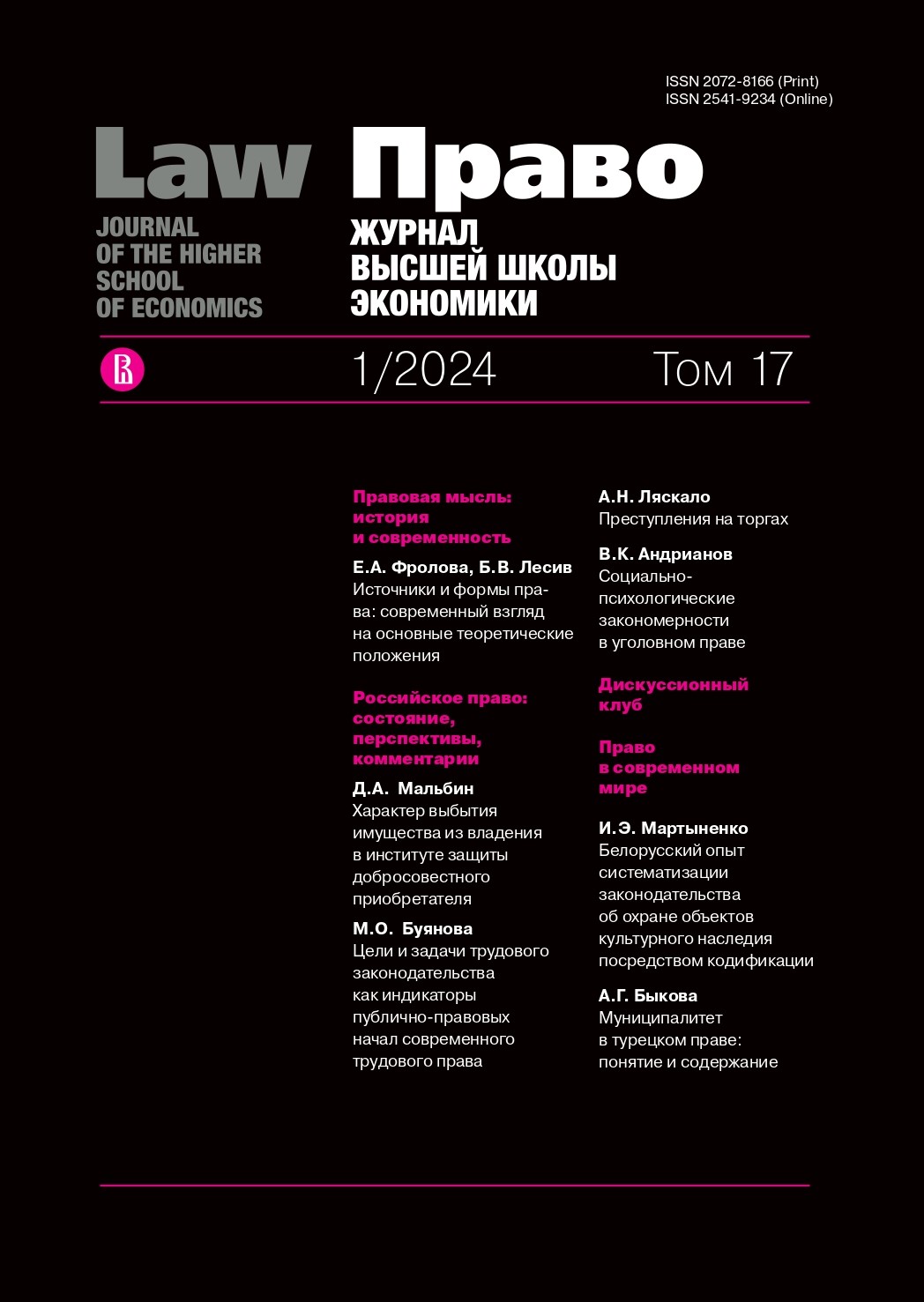Муниципалитет в турецком праве: понятие и содержание
Аннотация
В Турции выделяют два вида городских муниципалитетов: город (административный центр района со статусом города или населенный пункт, в котором проживает 5000 человек и более) и столичный город (провинциальные муниципалитеты с общей численностью населения более 750 000 человек). Предметом настоящей статьи является анализ категориального содержания муниципалитета первого уровня в административной доктрине и праве Турции. Обращение к теме оправдано несколькими факторами. Среди русскоязычных научных статей и монографий почти нет посвященных турецкому доктринальному пониманию категории «муниципалитет». Слабая изученность предмета в российской литературе не позволяет проводить сравнительный анализ категориального аппарата законодательств двух стран — России и Турции, а значит не позволяет сравнивать опыт становления и развития местного управления в Турции, характеризуя организационные модели, правовые, территориальные и экономические основы местного самоуправления (управления), с другими странами. В турецкой доктрине накоплен значительный опыт изучения деятельности муниципалитетов. Целью настоящей статьи выступает определение базовых признаков муниципалитета первого уровня, установленных законодателем Турции, таких как городская местность и территория города, статус публичного юридического лица, административная и финансовая автономия муниципалитета, и административная опека как элемент децентрализации управления в системе исполнительной власти страны. На основе методологии формально-логического анализа и сравнительного правоведения в статье раскрыты особенности сущностных характеристик муниципалитета. Сделан вывод, что правовые основания существования муниципалитетов связаны с правовой структурой административного устройства государства. На понимание муниципалитета существенное влияние оказала унитарная форма государственного устройства и децентрализованный административный способ управления в Турецкой Республике. Доказывается, что муниципалитет, наделяющийся статусом публичного юридического лица, существенно отличается от частного юридического лица. Одним из проблемных и вместе с тем важных признаков в понимании муниципалитета является административная опека. Анализ законодательства Турции позволяет говорить о наметившейся тенденции укрепления местной автономии путем сокращения практики опеки.
Литература
Akyılmaz B., Sezginer M., Kaya C. (2023) Turkish Administrative Law. Ankara: Seçkin Publ., 824 p. (in Turkish)
Atay E. (2009) Administrative Law. Ankara: Turhan Kitabevi (in Turkish)
Aydin D. (2017) Debates on Corporate Criminal Liability. Dispute Court Journal, no. 10, pp. 97-110. Available at: https://dergipark.org.tr/tr/download/article-fi-le/394221 (accessed: 23.03.2023) (in Turkish)
Budagova A.S. (1994) Organization of Local Power in Turkey. Constitutional and Legal Aspect: a review. Moscow: INION, 21 p. (in Russ.)
Çağlayan R. (2016) The Concepts of Public Corporate Entity. Dispute Court Journal, no. 7, pp. 373-398. Available at: https://dergipark.org.tr/tr/download/article-fi-le/229908 (accessed: 23.03.2023) (in Turkish)
Çiner C., Karakaya O. (2013) Central-Local Relations and Transformation of Territorial Administration. Ankara University SBF Journal, vol. 68, no. 2, pp. 63-93.(in Turkish) DOI: https://doi.org/10.1501/SBFder_0000002280
Derdiman R. (2021) Assessments on Criteria of Public Legal Person. International Journal of Management Academy, vol. 4, no. 3, pp. 545-573. (in Turkish) DOI: https://doi.org/10.33712/mana.969142
Gökyurt F., Kındap A., Sarı V.İ. (2015) Does Turkey Need a New Definition of City? Contemporary Local Governments, vol. 24, no. 1, pp. 1-32 (in Turkish)
Gönül H. (2019) Administrative Tutelage Supervision and Civil Administration. Available at: http://acikerisim.karabuk.edu.tr:8080/xmlui/bitstream/handle/123456789/ 728/10314052.pdf?sequence=1&isAllowed=y (accessed: 23.03.2023) (in Turkish)
Gözler K., Kaplan G. (2019) Administrative Law Courses. Bursa: Ekin Basım Yayın, 800 p. (in Turkish)
Günday M. (2011) Administrative Law. Ankara: İmaj Yayıncılık, 654 p. (in Turkish)
Gürsoy O., Sadioğlu U. (2022) New Concepts That Emerged in the 21st Century Related to the City. Ankara University SBF Journal, vol. 77, no. 1, pp. 45-68. (in Turkish) DOI: https://doi.org/10.33630/ausbf.995115
Karahanoğulları O. (2021) General Administrative Law. Organization of Administration Public Services. Available at: http://80.251.40.59/politics.ankara.edu.tr.kara-han/makalerer/teskilat-kamu-hizmetinin-orgutltnmesi.pdf (in Turkish)
Karamanukyan D.T. (2016) The Legal Nature of Administrative Agencies in the USA. Vestnik Omskoy yuridicheskoy akademii=Bulletin of Omsk Law Academy, no. 1, pp. 85-90. (in Russ.) DOI: https://doi.org/10.19073/2306-1340-2016-1-85-90
Karaoğlu S. (2018) Civil Law. Available at: https://hukukdershanesi.com/wp-con-tent/uploads/2020/03/Medeni-hukuk-Serkan-hoca-ders-notları.pdf (accessed: 17.04.2023) (in Turkish)
Kavruk H., Yayli H. (2008) Evaluation of Arrangements About Administrative Supervision on 2004 Municipality Reform Studies and a Research. Gazi University Faculty of Economics and Administrative Sciences Journal, vol. 10, no. 3, pp. 1-31. Available at: https://dergipark.org.tr/en/download/article-file/287417 (accessed: 23.03.2023) (in Turkish)
Kaya T., Pekküçükşen Ş. (2019) Principle of Administrative Integrity and Administrative Tutelage Control over Local Governments in Turkey. Ankara: İksad Publishing, 173 p. Available at: https://iksadyayinevi.com/home/turkiyede-idarenin-bu-tunlugu-ilkesi-ve-yerel-yonetimler-uzerinde-idari-vesayet-denetimi/ (accessed: 23.03.2023) (in Turkish).
Keleş R. (2006) Urbanization Policy. Ankara: İmge Kitabevi, 703 p. (in Turkish)
Keleş R. (1961) Urbanization Movements in Terms of City and Regional Planning. Ankara: Palme Yayıncılık, 290 p. (in Turkish)
Minibaeva E.I. (2014) Local Self-Government in Turkey. In: State and Law 2014: proposals, projects, methods. Collection of the international scholar conference papers. Krakow: Diamand, pp. 41-43 (in Russ.)
Moğol T., Taraktaş A., Çakir T., Varcan N. (2019) Local Administrations Finance. Eskisehir: Anadolu University, 215 p. Available at: https://ets.anadolu.edu.tr/stor-age/nfs/MLY302U/ebook/MLY302U-14V0S1-8-0-1-SV3-ebook.pdf (accessed: 17.04.2023) (in Turkish)
Öcal Ş. (2018) Civil Law I. Eskisehir: Anadolu University, 164 p. Available at: ht-tps://ets.anadolu.edu.tr/storage/nfs/HUK105U-Y/ebook/HUK105U-Y-11V1S1-10-0-0-SV1-ebook.pdf (accessed: 17.04.2023) (in Turkish)
Sadiç V., İşler İ. (2020) The Development Agencies and Concept of Public Legal Personality. Fiscaoeconomia, vol. 4, iss. 3, pp. 722-735. (in Turkish) DOI: https://doi.org/10.25295/fsecon.783925
Titova T.P (2002) A Review of a book: Polatoglu A. Turkish Local Government: the Need for Reform. Middle Eastern Studies. L., 2000. Vol. 36, no. 4. Social Sciences and Humanities. Domestic and Foreign Literature. Series 4, no. 1, pp. 97-100 (in Russ.) DOI: https://doi.org/10.1080/00263200008701337
Uporov I.V. (2022) Local Government in Turkey: Brief Overview of Constitutional Standards. Humanitarian Scholar Bulletin, no. 1, pp. 139-145 (in Russ).
Yoloğlu A., Zorlu F. (2020) Definition of Rurality and Rural Areas in Turkey: A Methodological Trial. Mersin University Social Sciences Institute Journal, vol. 3, no. 2, pp. 145-176 (in Turkish)
Ziyaoğlu R. (1971) History of Istanbul Judges, Mayors, Mayors And Parties: 1453–1971. Istanbul: İsmail Akgün Printing House, 783 p. (in Turkish)
Copyright (c) 2024 Право. Журнал Высшей школы экономики

Это произведение доступно по лицензии Creative Commons «Attribution-ShareAlike» («Атрибуция — На тех же условиях») 4.0 Всемирная.


















